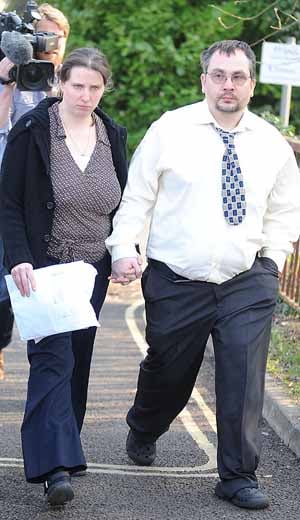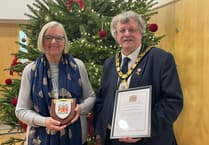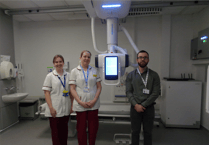A MINEHEAD couple kept a menagerie of animals, many of them malnourished and potentially suffering from contagious diseases, in their semi-detached home together with their five children, Taunton Magistrates Court was told.
James and Nicola Hood were found to have 56 dogs, six birds, three cats and four chinchillas crammed into the rooms and back garden of their property in Queen's Road.
In one bedroom, a nine-month-old baby was found lying, crying in a cot covered in faeces from the cages of four love birds which were hanging overhead.
Hood, 40, and his 31-year-old wife pleaded guilty to nine animal welfare charges after the court heard they had turned their house into a "makeshift animal sanctuary" for pets which would otherwise have been put down or whose owners could not care for them.
Neil Scott, prosecuting, told magistrates: "These offences arose out of a visit carried out by officers from the RSPCA on October 17 last year. It was the defendants' home where they lived with their five children.
"On arrival, Inspector Amanda Swift was, after some discussions, allowed access by Hood. She was met by a strong smell of ammonia and asked to see the animals.
"When she and a colleague were allowed to do so, they were swamped by a sea of dogs which were very excited and barking wildly. Hood struggled to keep control of them.
"The officers withdrew but returned with reinforcements including police officers and vets. During subsequent events, they discovered a huge number of animals at the property."
The Hoods were arrested and during interview admitted all the offences - three counts of causing unnecessary suffering and six charges of treatment contrary to the Animal Welfare Act - involving the dogs, cats and birds.
The dogs found included 34 huskies, four collies, two German shepherds, two labradors, one boxer, two Staffordshire bull terriers with two puppies, three Dobermans, two Rottveilers and a greyhound.
They were suffering from a variety of ear, eye and skin problems and most were malnourished and underweight, added Mr Scott.
In the house, a four-bed semi, curtains were drawn and furniture was piled high, according to Inspector Swift's report.
There were a variety of dog cages and leads scattered around the downstairs.
Mr Scott added: "In the hall there were two dog cages; in the front room there were leads tied to the furniture, two puppies and a huskie were found in a cage, there were a number of bird cages containing parrots and love birds.
"In the back garden it was a similar scene . . . there were more dogs than they could count.
"In the room behind the front room were two Staffordshire puppies in a basket and a box. A stair lift had a number of dog leads attached to it.
"In an upstairs bathroom were three cats discovered in boxes which were piled on top of each other and the impression was formed the animals were kept there permanently.
"In a bedroom a young child was discovered crying in a cot. On the wall were four cages of love birds and excrement from them was found on the cot bedding and the child."
All the animals were found to be deprived of the five RSPCA freedoms to which they have a legal right - from hunger and thirst, from discomfort, from pain, injury or disease, from fear and distress and to be allowed to express normal behaviour.
Inspector Swift also compiled a detailed table of the complaints from which the dogs were found to be suffering and she had drawn up a chart of their body weights which was submitted in the court papers.
It showed that 47 were found to have been suffering from inadequate nutrition, scoring three on a scale where seven was the norm, for up to three months and some possibly even longer.
Some 15 had otitis externa, an ear complaint, some six conjunctivitis in their eyes, 11 had skin disease, 28 had poor coats or matted fur, eight had dental problems and ten were found to have hip pain, possibly since birth.
Mr Scott said: "Some of these conditions were transmittable from animals to humans. The creatures had suffered prolonged neglect in the highest category."
Pierce Brunt, presiding magistrate, asked for clarification about the circumstances surrounding the family's five children and it was confirmed all were resident there.
The child in the bedroom was just nine months old and its exposure to the birds and their faeces meant it could have contracted parrot fever, aspergillosis, a fungal infection, salmonella and campylobacter, both bacteria which can cause fever, pain, stomach cramps and diarrhoea.
Ian Denly, for the couple, said: "Ironically, the Hoods are animal-loving people who sought to look after animals who were destined to be euthanised.
"They also trawled the internet for animals whose owners were unable to look after them and simply opened their own door.
"Their home was effectively an animal sanctuary but they were not able to look after all these animals by the sheer volume of the number they took in."
The case was adjourned by Mr Brunt until April 19 to allow for the preparation of psychiatric reports prior to sentencing.





Comments
This article has no comments yet. Be the first to leave a comment.